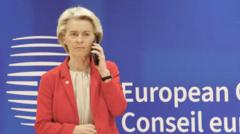A European court has declared that the European Commission must release text messages between its president, Ursula von der Leyen, and Pfizer CEO Albert Bourla relating to COVID-19 vaccine negotiations, undermining the Commission's previous refusal to disclose the information. This decision follows a legal challenge from an investigative journalist who sought transparency regarding a pivotal contract worth billions of euros that was signed in 2021. The ruling is seen as a landmark victory for transparency in the EU, continuing to raise questions about the accountability and openness of governmental operations during critical periods such as the pandemic.
### EU Court Rules Against Commission's Denial of von der Leyen-Pfizer Messages

### EU Court Rules Against Commission's Denial of von der Leyen-Pfizer Messages
Recent court ruling mandates transparency in communications over vaccine procurement.
The General Court of the European Union ruled that the Commission failed to provide a valid rationale for withholding the text messages exchanged between von der Leyen and Bourla. Investigative journalist Alexander Fanta filed a Freedom of Information request aiming to access these communications, which coincided with the EU securing billions in vaccine doses from Pfizer, including an additional 1.8 billion doses.
Though the content of the messages remains undisclosed, the case—dubbed "Pfizergate"—has sparked significant discussion regarding transparency and governance in the EU. Transparency International praised the ruling as a transformative step towards improving access to information and challenged the Commission's restrictive approach.
The controversy began in April 2021 when a New York Times article revealed private negotiations between von der Leyen and Pfizer’s CEO after BioNTech received approval for its COVID-19 vaccine. Consequently, Fanta applied for information on communications from January 2021 to May 2022 but was initially denied access. The Commission's justification hinged on ambiguity regarding the status of SMS records in transparency protocols.
Following Fanta's attempt to appeal to the European Ombudsman, an investigation identified a failure in administration on the Commission's part. The General Court's recent decision emphasized that the burden of proof lies with the Commission to verify the existence—or lack thereof—of the requested documents, and criticized the executive body's reliance on unsubstantiated claims.
Given the sensitive nature of the negotiations during the pandemic response and the financial implications of the contracts finalized, the ruling poses a reputational risk to von der Leyen. The European Commission has stated its intention to review the court's decision in detail, reiterating its commitment to transparency while grappling with the implications of this landmark ruling.
Though the content of the messages remains undisclosed, the case—dubbed "Pfizergate"—has sparked significant discussion regarding transparency and governance in the EU. Transparency International praised the ruling as a transformative step towards improving access to information and challenged the Commission's restrictive approach.
The controversy began in April 2021 when a New York Times article revealed private negotiations between von der Leyen and Pfizer’s CEO after BioNTech received approval for its COVID-19 vaccine. Consequently, Fanta applied for information on communications from January 2021 to May 2022 but was initially denied access. The Commission's justification hinged on ambiguity regarding the status of SMS records in transparency protocols.
Following Fanta's attempt to appeal to the European Ombudsman, an investigation identified a failure in administration on the Commission's part. The General Court's recent decision emphasized that the burden of proof lies with the Commission to verify the existence—or lack thereof—of the requested documents, and criticized the executive body's reliance on unsubstantiated claims.
Given the sensitive nature of the negotiations during the pandemic response and the financial implications of the contracts finalized, the ruling poses a reputational risk to von der Leyen. The European Commission has stated its intention to review the court's decision in detail, reiterating its commitment to transparency while grappling with the implications of this landmark ruling.




















